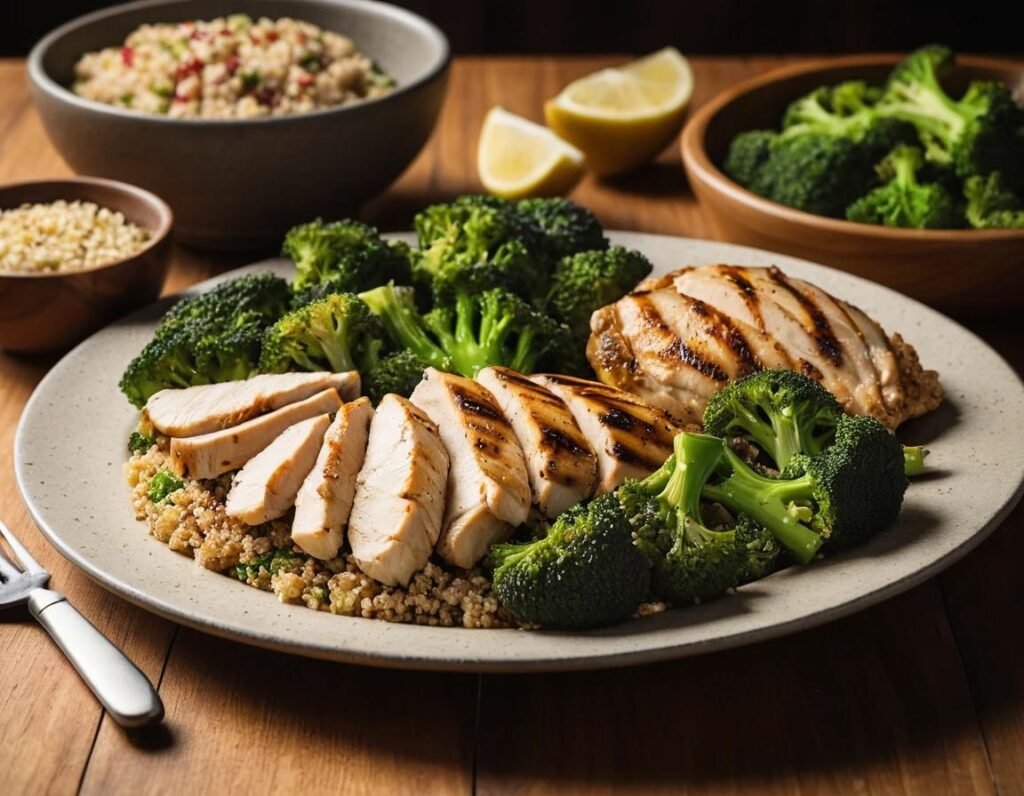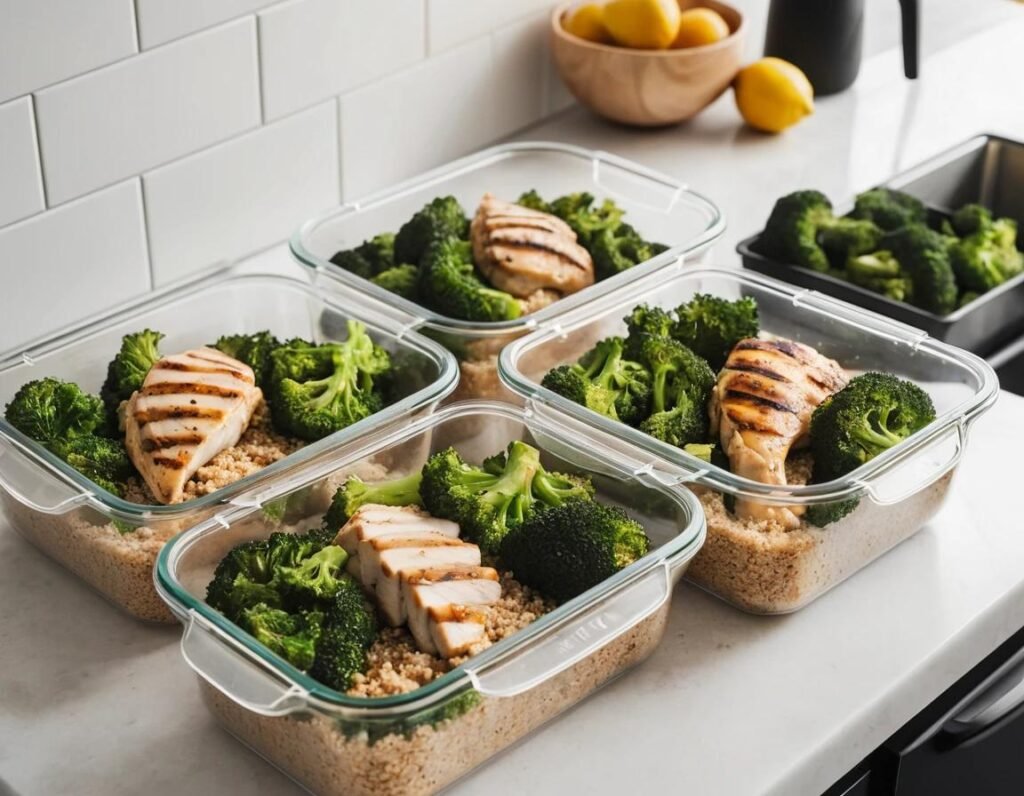Table of Contents
Introduction
A high-protein meal for night is a carefully planned dish that emphasizes protein as its main nutrient, consumed during the evening hours. Protein is a critical macronutrient responsible for building and repairing tissues, supporting muscle recovery, and regulating key bodily functions. While most people associate protein-rich meals with breakfast or lunch, consuming adequate protein at night can offer unique benefits, such as muscle repair during sleep, improved satiety, and support for weight management goals.
The question often arises: Is it okay to eat a protein-packed meal before bed? The answer is yes, but the type and portion of the protein matter. This article explores the importance of nighttime protein consumption, the best food choices, and tips for integrating high-protein meals into your evening routine.
What is a High-Protein Meal?
Defining a High-Protein Meal
A high-protein meal is one that contains a significant portion of protein relative to other macronutrients like carbohydrates and fats. On average, a meal is considered high-protein if it provides at least 20-30 grams of protein per serving.
Essential Nutrients in High-Protein Meals
A well-balanced high-protein meal includes more than just protein. Key components are:
- Lean Proteins: Chicken breast, fish, tofu, or eggs.
- Healthy Fats: Avocado, nuts, seeds, or olive oil.
- Complex Carbohydrates: Whole grains, sweet potatoes, or vegetables for fiber and sustained energy.
Protein’s Role in the Body
Protein plays multiple roles essential for nighttime:
- Muscle Repair and Growth: As you rest, your body enters a recovery phase. Consuming protein ensures amino acids are available to repair muscles damaged during daily activities or workouts.
- Satiety and Appetite Control: Protein takes longer to digest than carbohydrates, helping you stay full longer and preventing late-night snacking.
- Metabolic Boost: Protein requires more energy for digestion, slightly increasing calorie burn overnight.
Benefits of Eating High Protein at Night
Muscle Recovery and Growth
When you sleep, your body undergoes significant muscle repair and regeneration. Protein contains amino acids like leucine, which are crucial for muscle protein synthesis. This is especially important for athletes or individuals engaging in strength training.
Improved Sleep Quality
Certain protein-rich foods, such as turkey or cottage cheese, contain tryptophan, an amino acid that promotes the production of serotonin and melatonin. These hormones play a role in calming the mind and enhancing sleep quality.
Weight Management
Protein is a satiating nutrient that reduces hunger hormones like ghrelin while increasing satiety hormones such as peptide YY. Eating a high-protein meal before bed can prevent overeating the following day, supporting weight loss or maintenance efforts.
Sustained Energy Levels
A protein-rich evening meal stabilizes blood sugar levels, providing a steady supply of energy through the night and into the morning.
Best Sources of Protein for Night
Choosing the right protein sources for your nighttime meal is crucial for optimizing digestion and ensuring you get the maximum benefits while you sleep. Not all protein is created equal, and some options are better suited for evening consumption due to their digestibility and nutrient profile.

Animal-Based Protein Options
Animal-based proteins are complete proteins, meaning they contain all nine essential amino acids necessary for muscle repair and recovery. Here are the top choices:
- Greek Yogurt
- Why it’s great: Greek yogurt is high in casein protein, a slow-digesting protein that provides a steady release of amino acids throughout the night.
- How to use it: Combine with a handful of nuts or fresh berries for a satisfying snack.
- Cottage Cheese
- Why it’s great: Like Greek yogurt, cottage cheese is rich in casein and also contains calcium, which supports sleep.
- How to use it: Enjoy it plain or with a drizzle of honey and sliced bananas.
- Eggs
- Why it’s great: Eggs are a versatile and easily digestible source of protein. They are also rich in tryptophan, promoting better sleep.
- How to use it: Prepare a scrambled egg with spinach or hard-boil eggs as a quick nighttime snack.
- Chicken or Turkey
- Why it’s great: These lean meats are high in protein and low in fat, making them ideal for a filling dinner without feeling overly heavy. Turkey, in particular, is rich in tryptophan.
- How to use it: Pair with steamed vegetables or a side of quinoa for a balanced meal.
- Fish (Salmon, Tuna, or Cod)
- Why it’s great: Fish provides high-quality protein along with omega-3 fatty acids, which have anti-inflammatory properties and promote heart health.
- How to use it: Grill a salmon fillet and serve it with asparagus and a dollop of Greek yogurt dressing.
Plant-Based Protein Options
For those following a vegetarian or vegan lifestyle, plant-based proteins offer excellent alternatives.
- Tofu
- Why it’s great: Tofu is a complete plant-based protein, making it an excellent choice for vegans. It’s also versatile and absorbs flavors well.
- How to use it: Stir-fry tofu with vegetables and soy sauce for a delicious, protein-packed dinner.
- Lentils and Legumes
- Why they’re great: Lentils and beans like chickpeas or black beans are rich in protein and fiber, promoting digestion and satiety.
- How to use them: Make a hearty lentil soup or a chickpea salad with olive oil and lemon.
- Quinoa
- Why it’s great: Quinoa is a complete protein and a great source of magnesium, which can help relax muscles and improve sleep quality.
- How to use it: Combine cooked quinoa with roasted vegetables and a sprinkle of nutritional yeast.
- Nuts and Seeds
- Why they’re great: Almonds, chia seeds, and pumpkin seeds are rich in protein and healthy fats, which support overall health and provide lasting energy.
- How to use them: Sprinkle chia seeds over yogurt or blend a handful of almonds into a smoothie.
- Protein Shakes (Plant-Based or Whey)
- Why they’re great: Protein shakes are a convenient way to meet your protein needs, especially if you’re short on time.
- How to use them: Mix your favorite protein powder with almond milk, a banana, and a spoonful of peanut butter for a nighttime drink.
If you’re looking for variety in your high protein meal for night, try incorporating tofu stir-fry or lentil soup.
Examples of High Protein Night Meals
1. Grilled Chicken and Steamed Vegetables
- Ingredients: Grilled chicken breast, broccoli, carrots, and olive oil.
- Why it works: Low in fat and carbs, this meal is easy to digest and provides lean protein for muscle recovery.
2. Cottage Cheese and Berries
- Ingredients: Cottage cheese, blueberries, and a sprinkle of flaxseeds.
- Why it works: The slow-digesting protein in cottage cheese keeps you full while the berries add antioxidants.
3. Lentil and Quinoa Bowl
- Ingredients: Cooked lentils, quinoa, cherry tomatoes, and avocado slices.
- Why it works: This plant-based meal offers complete protein and fiber to aid digestion.
4. Baked Salmon with Asparagus
- Ingredients: Salmon fillet, asparagus spears, and a drizzle of lemon juice.
- Why it works: Salmon’s protein and healthy fats combine with asparagus’s nutrients for a well-rounded meal.
5. Scrambled Eggs with Spinach
- Ingredients: Two eggs, fresh spinach, and a dash of olive oil.
- Why it works: Eggs are quick to prepare and contain sleep-promoting tryptophan.
Tips for Preparing High Protein Night Meals
Preparing a high-protein meal for the night requires balance, mindfulness, and a focus on digestion-friendly options. These tips will help you create meals that nourish your body without leaving you feeling too full or disrupting your sleep.

1. Practice Portion Control
- Why it’s important: Overeating at night can lead to indigestion, bloating, and disrupted sleep. While protein is beneficial, portion control is key to avoiding unnecessary calorie consumption.
- How to implement: Aim for 20-30 grams of protein per meal, which is sufficient for muscle repair and recovery without being excessive.
2. Combine Protein with Healthy Fats and Fiber
- Why it’s important: Pairing protein with fats and fiber helps slow digestion, providing sustained energy throughout the night.
- Examples:
- Add avocado slices to grilled chicken.
- Sprinkle chia seeds over Greek yogurt.
- Serve salmon with a side of quinoa and roasted vegetables.
3. Opt for Slow-Digesting Proteins
- Why it’s important: Proteins like casein (found in dairy products) digest slowly, supplying your body with a steady stream of amino acids overnight.
- Examples: Cottage cheese, Greek yogurt, or a casein-based protein shake are excellent choices before bed.
4. Avoid Heavy or Greasy Foods
- Why it’s important: Foods that are fried, oily, or high in saturated fat can cause indigestion and disrupt sleep.
- How to implement: Opt for lean protein sources like chicken breast, tofu, or eggs instead of fried meats or high-fat cuts.
5. Prepare Meals in Advance
- Why it’s important: A lack of preparation can lead to poor food choices, such as reaching for processed snacks or sugary options late at night. Therefore, preparing a high protein meal for night ahead of time ensures you stick to your nutrition goals.
- How to implement: Batch cook protein-rich meals like baked chicken, grilled fish, or lentil soup, and store them in the fridge for easy access.
6. Stay Hydrated
- Why it’s important: Proper hydration aids digestion and helps your body process protein efficiently.
- How to implement: Drink water throughout the evening, but limit fluids right before bed to avoid frequent trips to the bathroom.
7. Season Smartly
- Why it’s important: Excessive salt or spicy seasonings can lead to bloating or acid reflux, which may disrupt sleep.
- How to implement: Use herbs like basil, thyme, or parsley and mild seasonings such as garlic or lemon juice for flavor without the adverse effects.
8. Time Your Meal Wisely
- Why it’s important: Eating too close to bedtime can cause discomfort, while eating too early might leave you hungry before sleep.
- How to implement: Aim to eat your high-protein meal 2-3 hours before going to bed to give your body time to digest.
9. Experiment with Plant-Based Alternatives
- Why it’s important: Plant-based proteins like tofu, lentils, and quinoa are easier on the stomach and can be just as effective as animal-based proteins for nighttime recovery.
- How to implement: Try a quinoa salad or tofu stir-fry for a lighter yet satisfying meal.
10. Avoid Sugary or Processed Foods
- Why it’s important: High-sugar foods can spike your blood sugar levels, leading to energy crashes and poor sleep quality.
- How to implement: Skip desserts or sweetened beverages and opt for natural sweeteners like fruit if needed.
Balanced Meal Example:
For a perfectly balanced high-protein night meal:
- Protein: Grilled chicken (30g protein).
- Fiber: Steamed broccoli (5g fiber).
- Healthy Fat: Avocado slices (10g fat).
FAQs
1. What is the best type of protein to eat before bed? The best type of protein for nighttime consumption is casein protein, found in dairy products like Greek yogurt and cottage cheese. Casein digests slowly, providing a sustained release of amino acids to support muscle repair and recovery during sleep. Other excellent options include lean meats, eggs, tofu, and plant-based protein shakes.
2. Are baked beans healthy? Baked beans can be a nutritious addition to your diet, offering a good source of plant-based protein and fiber. However, many commercially canned baked beans contain high levels of added sugars and sodium, which can diminish their health benefits. Opting for low-sugar and low-sodium varieties, or preparing them at home, can make baked beans a healthier choice. For a detailed answer on this question, check out this article.
3. Are plant-based proteins effective for night meals? Yes, plant-based proteins like tofu, lentils, chickpeas, and quinoa are excellent for nighttime meals. These options are rich in amino acids, fiber, and other nutrients that support digestion and satiety. For complete proteins, combine plant-based sources, such as rice and beans or hummus with whole-grain pita bread.
4. How much protein should I eat at night? A nighttime meal should provide 20-30 grams of protein, which is sufficient to support muscle repair, recovery, and metabolism without overloading your digestive system. Larger amounts may not be fully utilized by the body and could lead to discomfort.
5. Is it okay to drink a protein shake before bed? Yes, drinking a protein shake before bed is a convenient way to meet your nighttime protein needs. Opt for a casein-based protein powder for slow digestion or a plant-based protein for a lighter option. Avoid shakes with added sugars or stimulants that could interfere with sleep.
6. Can high-protein meals aid in weight loss? Yes, high-protein meals can support weight loss by increasing satiety, reducing hunger hormones like ghrelin, and stabilizing blood sugar levels. Eating protein at night helps prevent late-night cravings and reduces the likelihood of overeating the next day. Pairing protein with fiber and healthy fats can further enhance its weight management benefits.
7. Which is healthier: ground chicken or ground turkey? Both ground chicken and ground turkey are lean protein sources with similar nutritional profiles. However, ground turkey, particularly white meat, tends to have slightly lower cholesterol levels and higher iron content compared to ground chicken. The healthiness of each also depends on the specific cuts used and preparation methods. For more insights on how they compare, read Ground Turkey vs. Ground Chicken: A Nutritional Comparison.
8. Is it bad to eat too much protein before bed? Eating excessive protein at night can lead to digestive discomfort, such as bloating or gas, and may contribute to excess calorie intake. Stick to the recommended portion sizes and balance protein with other nutrients for a well-rounded meal.
9. Is cottage cheese healthier than yogurt? Cottage cheese and yogurt both offer unique health benefits, but their nutritional content differs. Cottage cheese is higher in protein, providing about 25 grams per cup, making it ideal for those focusing on protein intake. On the other hand, yogurt, particularly Greek yogurt, offers probiotics that support gut health. To decide which is better for your dietary needs, explore Cottage Cheese vs. Yogurt: Which Is Healthier?.
10. How can I make a high-protein meal quickly? Some quick and easy high-protein nighttime meals include:
- Scrambled eggs with spinach (ready in 5 minutes).
- Greek yogurt with nuts and seeds.
- Grilled chicken breast with steamed vegetables.
- A protein shake made with almond milk, banana, and protein powder.





